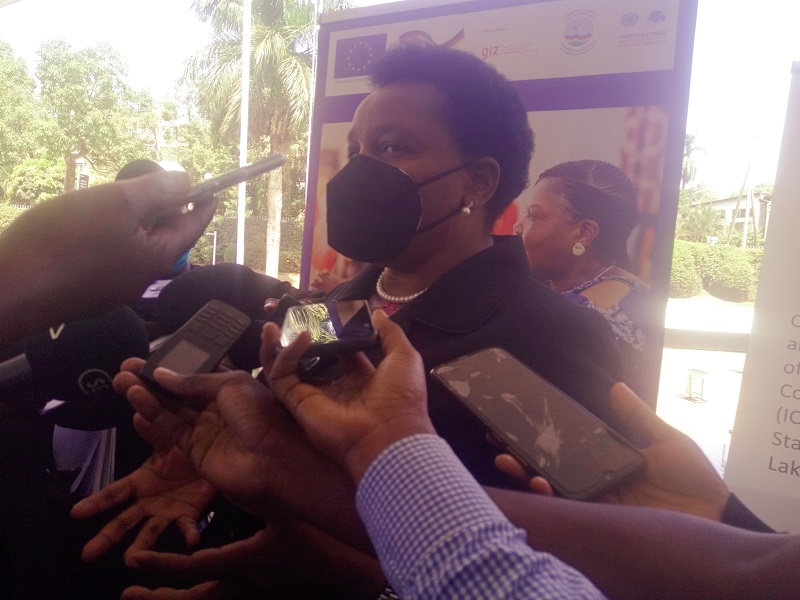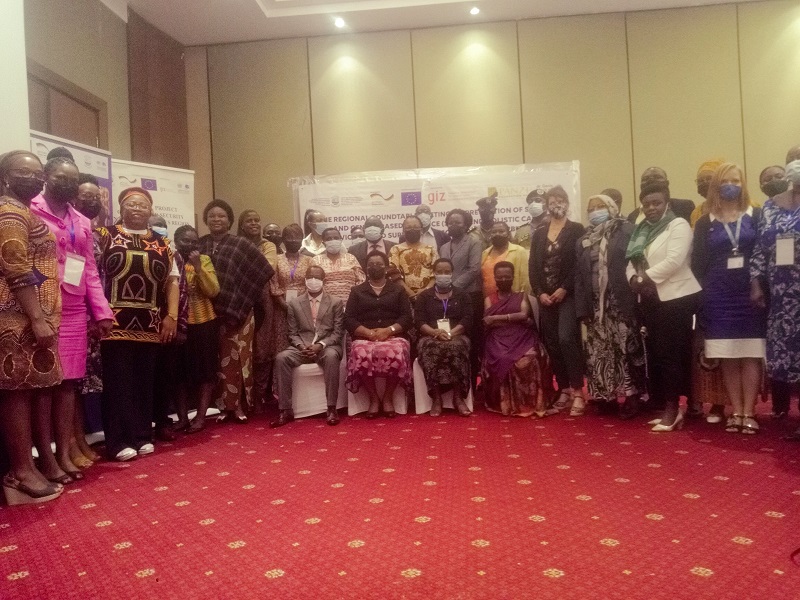
KAMPALA – State Minister for Gender and Culture in the Ugandan Cabinet, Peace Mutuuzo has reminded that the Government of Uganda has put in place laws and policies to address all forms of Gender-Based Violence, including female genital mutilation in addition to a number of policies developed to address the same.
“For example, the National Policy on Elimination of Gender-Based Violence was developed in 2016, together with a National Action for its implementation This complements the Domestic Violence Act 2010, the Prohibition of Trafficking in Persons Act 2011 and the Prohibition of Female Genital Mutilation Act 2010.”
The Minister was on Thursday launching the High-level roundtable and workshop on the implementation of survivor-centered holistic care for victims and survivors of SGBV in the International Conference Center on the Great Lakes (ICGLR) the Member States at Kampala Sheraton Hotel.
The two-day roundtable and workshop focused on; sharing lessons learned during a two-year pilot initiative of the ICGLR’s SGBV regional training programme using the holistic integrated training model, sharing the regional research finding of the significance of the holistic model to SGBV response, including survivor’s perspectives and priorities for holistic care and challenges facing stakeholders involved in the implementation of holistic care, and discussing progress on the implementation of Article 11 of the Kampala Declaration related to holistic services for victims and survivors of SGBV in ICGLR Member States and agreeing on way forward and action points to ensure commitment from all the member states to adapt the holistic model over a five-year period.
Uganda is a signatory to the Kampala Declaration of 2011 during which it committed itself to put in place measures for supporting victims and survivors of sexual and gender-based violence (SGBV) through establishment of shelters for provision of holistic services as well as creating and enhancing income generation initiatives.
Mutuuzo told the guests that Uganda has put in place a multi-sectoral framework for addressing Gender-Based Violence and a strong coordination mechanism which brings together all stakeholders for mutual support, learning and accountability.
“Under this framework Government receives funding for supporting from Development Partners for GBV programmes in various regions of the country, especially Karamoja, Sebei, West Nile and the Northern Region where the prevalence of GBV is still high Under these partnerships Cultural Institutions and Religious Institutions are supported to implement GBV prevention and response programmes.”
“We are enjoying a good relationship with Civil Society Organizations, and this has led to establishment of GBV Shelters in 18 districts which provide holistic services. ranging from medical care, psycho-social support, legal services as well as reintegration and mediation. There is a great collaboration between government and Civil Society Organizations, and some districts have provided buildings while others have provided land for building shelters,” she added.
She said that Uganda has identified economic empowerment as a game-changer for addressing Gender-Based Violence and other forms of gender inequality.
“To this end, a number of economic empowerment programmes are in place, targeting GBV survivors and other vulnerable women and girls. Examples include the Uganda Women Entrepreneurship Programme, the Grants for Persons with Disabilities, the Social de Assistance Grants for Development and the Youth Livelihoods Programme.”
She, however, noted that amidst these achievements, the country encounters several challenges including;
i) The GBV shelters lack sustainable funding because they are donor-funded and they are not present in all districts due to limited funding.
ii) GBV programmes are mainly funded by development partners; a situation that undermines capacity for sustainability. To this end, she called upon all member states to prioritize GBV in national budgets as matter of urgency so that all key sectors engaged in addressing GBV have the requisite resources to comprehensively address it
iii) Negative social norms are deeply rooted in the patriarchal cultural practices of communities which undermines the enforcement of laws.
“Distinguished participants, as we deliberate on the commitment to comprehensively address GBV, the establishment of comprehensive one-stop centres in the region is of paramount importance, as well as the need to strengthen prevention through addressing social norms and behaviors that propagate it. Our Governments must prioritize GBV through allocation of both financial and human resources. It is my sincere hope that by the end of this meeting we will come up with a roadmap for achieving this, noting that GBV has continued to increase during the COVID 19 pandemic. Now is the time to act.”
She lauded the ICGL Team that organized the conference and the delegates from the Member States for creating time to come to Uganda and attend.
The event intended at bringing together survivors of SGBV and different actors from the region in a timely moment, a few weeks before the 10th anniversary of the Kampala Declaration, to take stock of regional progress on engagements related to holistic care for victims and survivors and the prevention and response to SGBV.
The results of the workshop and event will all contribute to the partners shared objective of ensuring that survivors of sexual and gender-based violence in the Great Lakes region have improved access to quality holistic assistance in their respective home countries.
The overall objective and vision guiding the partners was to ensure that survivors of sexual and gender-based violence in the Great Lakes region have improved access to quality holistic assistance in their respective home countries.
The roundtable and workshop’s specific objectives were to:
1) Assess progress on implementing and strengthening the quality of holistic care services for victims and survivors of SGBV in member states and to agree upon perspectives to accelerate the implementation of these engagements in a five-year period.
2) Bring onboard partners and stakeholders to support the implementation of survivor-centred holistic care services, in keeping with the regional integrated model and to renew the existing commitments of ICGLR member states and other actors in adopting the holistic care approach

Background
Following the recommendations of the Ministers of Gender and justice to the ICGLR to develop a holistic model to address Sexual and Gender-Based Violence (SGBV) at the 2019 High-Level Meeting in Congo-Brazzaville, the ICGLR Regional Training Facility, Panzi Foundation DRC and the Dr. Denis Mukwege Foundation collaborated to amongst other activities develop an integrated model that holistically addresses SGBV.
To this end, an Integrated Model that combines Panzi’s holistic “one-stop centre” model of care to SGBV survivors (psycho-social, medical, legal assistance and reintegration support) with the RTF’s socio-ecological SGBV training model was developed. In 2020 and 2021, this new regional Integrated model was piloted via Training of Trainers sessions in 5 Member States (Central African Republic (CAR) Democratic Republic of Congo (DRC), Rwanda, Uganda and Zambia)
Ms Adrine Atwiine of ICGLR told the guests that It is against this background that the Regional Training Facility (RTF) of the International Conference on the Great Lakes Region (ICGLR) together with partners Panzi Foundation DRC and the Dr. Denis Mukwege Foundation are convening the Gender Experts from the Ministry of Gender from the 12 ICGLR member states, SGBV survivors, practitioners, donors and multi-lateral partners engaged in holistic SGBV prevention and response to participate in a roundtable and workshop event
Background on partners
in 2014, the ICGLR Regional Training Facility (RTF) was launched. The RTF, based in Kampala, Uganda, provides training for judicial officers, police officers, medical officers, social workers, attorneys and prosecutors on handling SGBV cases and related issues: To date, the RTF has trained over 100 trainers across the 12 ICGLR Member States, including 10 Master trainers and 130 national trainers (10 in each of the ICGLR Member States (20 in DRC)) These 130 national trainers have already and will continue to go on training SGBV professionals in their respective countries. National Action Plans to continue this regional initiative are in the process of being reviewed and validated.
The Dr. Denis Mukwege Foundation is an international human rights organisation working together. with survivors of wartime sexual from around the world. Established in 2016, with headquarters in The Hague and Geneva, it works internationally to bring an end to the use of sexual violence as a method of warfare. The Mukwege Foundation collaborates closely with Panzi Foundation DRC to roll out its comprehensive holistic model of care in other conflict-affected countries via capacity building and support to local actors in the provision of holistic assistance to survivors of sexual violence and in particular, conflict-related sexual violence.
Since 2017, the Mukwege Foundation has been a member of a consortium committed to supporting and accompanying the establishment of a holistic care centre for victims of sexual violence (5V) and gender-based violence (GBV) in Central African Republic, with financial support from the French Development Agency and the Pierre Fabre Foundation). This holistic “one-stop-centre” care initiative is called the “Nengo” or “Dignity” project in Sango.





